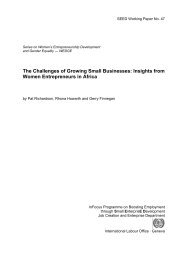Social and Solidarity Economy: Our common road towards Decent ...
Social and Solidarity Economy: Our common road towards Decent ...
Social and Solidarity Economy: Our common road towards Decent ...
You also want an ePaper? Increase the reach of your titles
YUMPU automatically turns print PDFs into web optimized ePapers that Google loves.
SOCIAL AND SOLIDARITY ECONOMY ACADEMY<br />
Foreword<br />
After the financial crisis in 2007-2008, some regions <strong>and</strong> countries, notably in Asia <strong>and</strong> Latin America,<br />
witnessed encouraging <strong>and</strong> rapid signs of recovery in their real economy, in terms of employment <strong>and</strong> poverty<br />
reduction. Nevertheless, since the sovereign debt crisis in Europe that started with the Greek episode in<br />
mid-2010 <strong>and</strong> the continuing balance sheet recession in the United States, the world has entered a new phase<br />
of global financial, economic <strong>and</strong> social crisis. In a context of major social <strong>and</strong> economic imbalances <strong>and</strong><br />
ever-growing instability, the ILO, with the support of many other stakeholders, advocates more equitable <strong>and</strong><br />
fair globalization, with decent work at the centre of public policy.<br />
The ILO Declaration on <strong>Social</strong> Justice for a Fair Globalization, adopted by the International Labour Conference<br />
in June 2008, already recognized that “productive, profitable <strong>and</strong> sustainable enterprises, together with a<br />
strong social economy <strong>and</strong> a viable public sector, are critical to sustainable economic development <strong>and</strong><br />
employment opportunities”. Indeed, the social <strong>and</strong> solidarity economy plays a significant <strong>and</strong> growing role in<br />
the real economy, by providing employment, social protection <strong>and</strong> other social <strong>and</strong> economic benefits. In the<br />
same vein, the Global Jobs Pact (2009) recognized that "cooperatives provide jobs in our communities from<br />
very small businesses to large multinationals".<br />
Because of their distinctive features <strong>and</strong> comparative advantages, including democratic governance <strong>and</strong><br />
autonomous management, social <strong>and</strong> solidarity economy enterprises <strong>and</strong> organizations are encouraged by an<br />
increasing number of States. Policy frameworks for the development of the social <strong>and</strong> solidarity economy at<br />
the national <strong>and</strong> regional levels are being set up across the world. This builds on partnerships among governments,<br />
social partners <strong>and</strong> civil society. It is also happening in countries in Latin America. For instance, policy <strong>and</strong><br />
legal reforms are taking place in Bolivia, Ecuador <strong>and</strong> Peru to acknowledge the role that cooperatives <strong>and</strong><br />
other social <strong>and</strong> solidarity economy organizations play in reducing poverty <strong>and</strong> promoting social inclusion.<br />
Today, the social <strong>and</strong> solidarity economy is a reality in many people´s lives because it promotes values <strong>and</strong><br />
principles that focus on people’s needs <strong>and</strong> on their communities. In a spirit of voluntary participation,<br />
self-help <strong>and</strong> self-reliance, <strong>and</strong> through enterprises <strong>and</strong> organizations, it seeks to balance economic success<br />
with fairness <strong>and</strong> social justice, from the local level to the global level. In Canada, where this second Academy<br />
is taking place, over 30% of the population are members of cooperatives. In Brazil, cooperatives produce three<br />
quarters of the wheat <strong>and</strong> 40% of the milk, <strong>and</strong> cooperative exports bring in over US$ 1.3 billion.<br />
Promoting the social economy means contributing to each dimension of the <strong>Decent</strong> Work Agenda. Enterprises<br />
<strong>and</strong> organizations in the social <strong>and</strong> solidarity economy create <strong>and</strong> sustain jobs <strong>and</strong> livelihoods, extend social<br />
protection, strengthen <strong>and</strong> extend social dialogue to all workers, <strong>and</strong> promote the application <strong>and</strong> enforcement<br />
of st<strong>and</strong>ards for all. In this time of crisis <strong>and</strong> instability, the promotion of the social <strong>and</strong> solidarity economy, within<br />
the <strong>Decent</strong> Work Agenda framework, is an efficient way to promote social justice <strong>and</strong> social inclusion in all regions.<br />
The ILO has been a pioneer in promoting the social <strong>and</strong> solidarity economy. In 1920, the ILO Director-General,<br />
Albert Thomas, created a Cooperative Branch, now the ILO Cooperative Programme. In the 1980s, the ILO<br />
developed the concept of ‘social finance’, <strong>and</strong> by the end of the 1990s it had become a pioneer in supporting<br />
the development of mutual benefit societies to extend social protection. In 2001, the ILC reached a “New<br />
Consensus” on social security that gave the highest priority to extending coverage to those that had none,<br />
leading the ILO to further increase its support to community-based protection schemes <strong>and</strong> mutual benefit<br />
societies. In 2002, after the adoption of the recommendation 193 on the promotion of cooperatives, the ILO<br />
iv<br />
READER

















